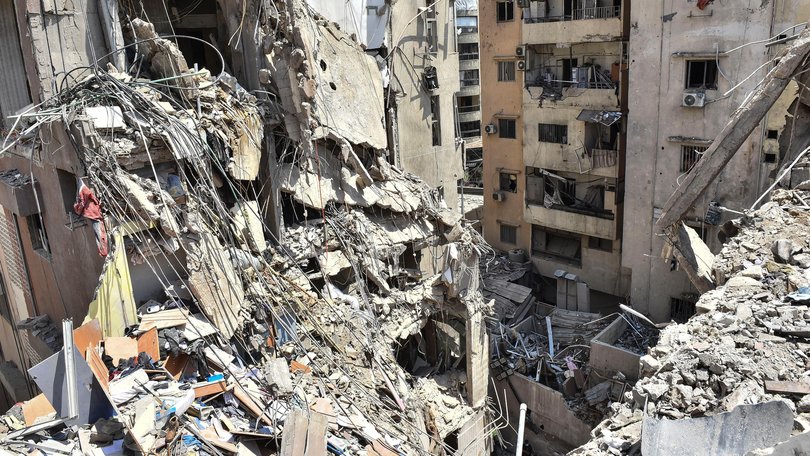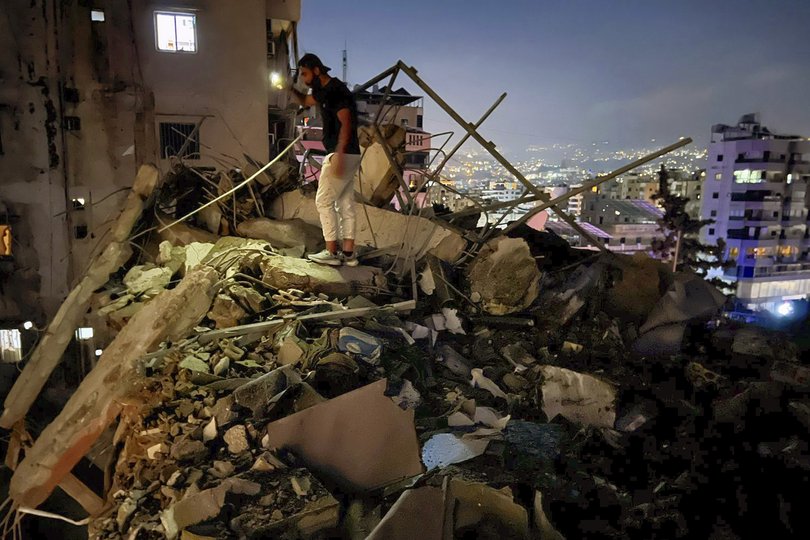MICHAEL USHER: History repeats itself as Israel strikes back against Hezbollah with deadly force
MICHAEL USHER: If Hezbollah militia keeps launching missiles at Israel from within Lebanon’s southern rural villages and hillsides, Israel will drop a hammer on Lebanon. It will not waste time.

“Now is the time to leave. If you are thinking of travelling to Lebanon, do not.”
The unequivocal warning from our Foreign Minister Penny Wong this week, urging Australians to avoid travel to that part of the Middle East, or to get the hell out as soon as possible.
Ms Wong is normally more guarded with her language. She’s the ultimate calm and measured diplomat who knows every word she uses is scrutinised by foreign nations who look to turn any statement made by Australia into a squabble or standoff.
Sign up to The Nightly's newsletters.
Get the first look at the digital newspaper, curated daily stories and breaking headlines delivered to your inbox.
By continuing you agree to our Terms and Privacy Policy.But in this case, the Foreign Minister was deadly serious and did not mince words. The Government estimates there are 15,000 Australians in Lebanon, but say that figure could be as high as 30,000.
If Hezbollah militia keeps launching missiles at Israel from within Lebanon’s southern rural villages and hillsides, Israel will drop a hammer on Lebanon. It will not waste time firing back into the regional areas where Hezbollah hides. It will strike the capital Beirut with dreadful force.
This isn’t idle analysis, it’s historical fact. Israel has done this before in 2006. The 34-day Israel-Lebanon war ruthlessly targeted Hezbollah fighters and leadership in all corners of Beirut. As it has done in Gaza, Israel’s airstrikes pulverised entire apartment blocks, struck office buildings with precision missiles and paralysed Beirut’s airport when the main runways were destroyed.
The only way out is a perilous road journey east across the border into Syria. But most Lebanese were blocked at the border. Or people fled by sea. It became the largest seaborne evacuation of a population since World War II.
A flotilla of international naval and merchant ships came to the rescue. I was there as a news correspondent during this war, watching this incredible scramble of scared citizens and foreign visitors cram the docks waiting for any vessel to take them onboard and navigate a journey to safety.
Thousands of Australians were there. And they were terrified. They packed whatever they could and waited, facing out to sea for a friendly ship to dock and give them safe passage. At their backs, bombs dropped on Beirut. Bombs so big the shockwaves thumped your chest and sucked the oxygen from the suburbs they struck.
The evacuating Australians weren’t just tourists. They were dual citizens, some were leaving behind property they’d bought, and many held up elderly parents reluctant to leave their homeland, but they knew they couldn’t survive bombardment or remain in a country ripped apart and isolated.

Our diplomats in Lebanon did an extraordinary job evacuating some 5000 Australians in 2006, making sure they all got out. We didn’t send any of our navy ships, but the embassy made sure friendly nations accepted every Australian. It cost tens of millions of dollars and there was a hope that many of the evacuated might pay for some of the cost of their passage to freedom, but that never really happened and the government never really pursued anyone for a few bucks toward the journey home.
But it’s a scenario the Government now wants to desperately avoid. They know war in that region will escalate. What Israel did last time was use the 34 days to try to obliterate Hezbollah. That worked for a short while until Iran came into the picture with funding, training and ideological indoctrination for a resurgent Hezbollah in Lebanon, a country crippled financially and politically.
I took a somewhat dangerous ride with Hezbollah into the parts of Beirut that Israel had demolished with airstrikes. They wanted to show how every day Lebanese were being killed by the Israeli army. Under escort by Hezbollah, we were warned that Israel was watching from afar and if it chose to strike this small convoy of cars to take out its enemies, the Israel Defence Force wouldn’t hesitate to strike, even if journalists were in the convoy. Needless to say, we didn’t stay in this area for long. But we saw first-hand the ruthless obliteration of targets Israel had determined to be hiding or harbouring Hezbollah leadership, weapons storage, or launch sites of its missiles.
Israel hoped then that wiping out Hezbollah might give the Lebanese population some space to remove them altogether from politics or influence in that country. Exactly like it’s done with Hamas in Palestine. A brutal, bloody way to bring about change, and protect Israel.
But what changed in Lebanon since 2006? The country is in more turmoil politically and economically, and Hezbollah disappeared into its remaining rat holes and emerged resurgent. This of course won’t stop Israel from using a sledgehammer to smash its neighbour to root out the rats. Its meticulous execution of the Hamas leader Ismail Haniyeh while visiting Tehran, and the surgical assassination of Hezbollah commander Fuad Shukr, 12 hours earlier in Beirut, tells us all that Israel has tried to cut the heads off the snakes, but now it’s preparing to burrow into the nests, while Hamas and Hezbollah militia scramble without their leaders, or at least before new leadership steps into the crosshairs.
Sadly, no one is taking the temperature down, and any international pressure on Israel is falling on deaf ears.
What Australia doesn’t want is its citizens in danger. Some war-weary Lebanese Australians may take the view that they’ve been through this conflict before, and they’ll be resilient again.
Our Foreign Minister would prefer to not have Australians caught up in an all-out war, and before the commercial flights are withdrawn from Lebanon, they get out now.
Originally published on The Nightly
